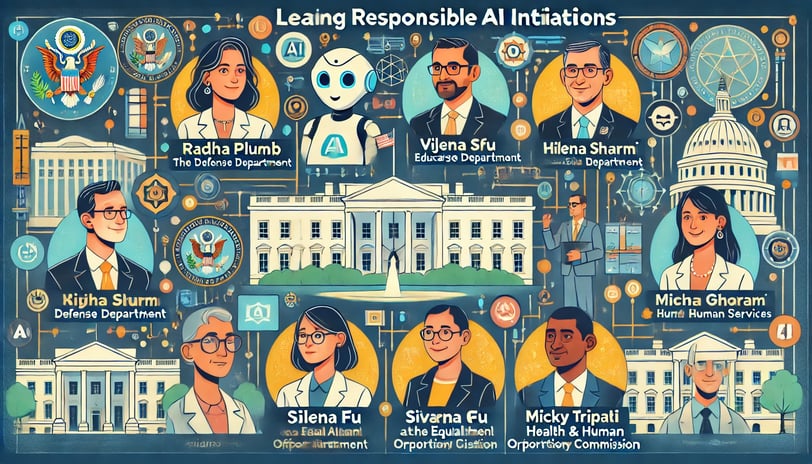The Chief AI Officers Leading Responsible AI Development Across Government
The role of CAIOs across various federal agencies is crucial for the ethical and effective use of AI, aligning with the broader goals set by the Biden-Harris Administration to harness AI's benefits while mitigating its risks.
NEWS
Key CAIOs and Their Contributions
Defense Department: Radha Plumb: Appointed as the Chief Digital and AI Officer in April 2024, Plumb has an extensive background, including roles at the White House, Energy Department, and private sector positions at RAND Corporation, Facebook, and Google. She oversees AI initiatives within the Department of Defense (DOD), focusing on innovation and risk management.
Education Department: Vijay Sharma: Serving as the Chief AI Officer since 2015, Sharma brings a wealth of experience from his previous role as the department's CTO. His tenure in federal government roles since 2010 has equipped him to lead AI initiatives aimed at enhancing educational technologies and administration.
Energy Department: Helena Fu: As the director of the newly created Office of Critical and Emerging Technology, Fu coordinates the department's AI efforts. Her prior roles include positions at the White House National Security Council and the Office of Science at DOE. Fu's work focuses on promoting innovation and managing AI risks.
Equal Employment Opportunity Commission: Sivaram Ghorakavi: Appointed in June 2024, Ghorakavi leads technology-focused partnerships and innovations to advance the EEOC’s mission. His background includes significant roles in Federal IT and at the U.S. Patent and Trademark Office.
Health and Human Services: Micky Tripathi: Acting as the National Coordinator for Health IT and interim CAIO, Tripathi co-chairs the HHS AI Task Force. He continues the work initiated by previous CAIOs to integrate AI into health IT systems for improved patient care and operational efficiency.
The Biden-Harris Administration's AI Strategy
The Biden-Harris Administration has emphasized the need for responsible AI development through several key initiatives:
Executive Orders and AI Bill of Rights: These directives aim to guide federal agencies in the safe and ethical use of AI, addressing concerns such as privacy, bias, and transparency.
AI Talent Surge: To support these efforts, the administration is actively recruiting AI talent to fill critical roles in various agencies, ensuring a robust and knowledgeable workforce to govern AI applications.
Ethical and Responsible AI Adoption
To ensure AI is used responsibly, federal agencies are adopting several principles:
Transparency: Agencies are required to be open about their AI use, including data sources and decision-making processes, to build public trust.
Accountability: Clear mechanisms, such as independent oversight bodies and public reporting, are in place to hold agencies accountable for their AI deployments.
Fairness and Non-discrimination: AI systems must be designed to avoid bias and ensure fair treatment of all individuals.
Privacy Protection: Robust measures are in place to safeguard individual privacy and ensure data used by AI systems is handled appropriately.
The efforts of CAIOs and the strategic initiatives set forth by the Biden-Harris Administration are paving the way for a future where AI is used ethically and effectively across government sectors, ensuring that the technology benefits all citizens while safeguarding their rights and privacy.


